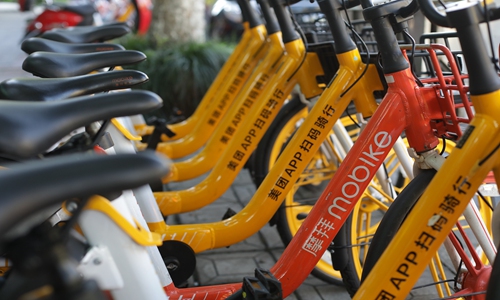HOME >> BUSINESS
Shared economy bids farewell to wild growth
By Zhang Hongpei Source:Global Times Published: 2019/11/13 19:23:40
Returning to original business logic is a good sign: analysts

A view of DiDi's headquarters in Beijing on November 3 Photos: VCG

A row of shared bicycles lined up on a street in Hangzhou, capital of East China's Zhejiang Province, in August Photos: VCG

A box of shared charging banks is displayed in a store in Xiangyang, Central China's Hubei Province, in 2017. Photos: VCG
Following sizzling development and wild growth over recent years, the sharing economy - a new economic model taking flight in China - has gradually landed on a sound and rational track.
Chinese ride-hailing giant DiDi recently announced it would re-launch its Hitch carpooling services in several cities in China at the end of this month, more than a year after the company suspended its P2P ride-sharing services due to the murder of a female passenger by her DiDi driver.
The re-launch follows a comprehensive safety review and product revamp that began in 2018. The redesigned service now boasts improved safety features, as well as more rigorous driver/passenger verification and rating mechanisms, the company said.
When the trial was first announced, it was stated that it will begin with trips under 50 kilometers in metro areas between 5 am and 8 pm for female users, and 5 am and 11 pm for male users.
After the 8 pm time restriction for female users aroused a broad discussion of gender discrimination, the company quickly adjusted its terms - an 8 pm end-of-service will apply to all users.
Industry insiders said that the Hitch services will reflect the nature of a shared economy better than DiDi's other businesses like its fast or special ride options, since it places users and drivers at the core of the company's services.
DiDi, which was valued at $56 billion earlier this year and claims to have amassed more than 550 million users globally, hasn't been able to turn a profit, according to media reports.
"DiDi's final decision to re-launch the Hitch services is due to its transport capacity and business value story," an anonymous industry insider said.
The company has continuously readjusted its business and enhanced safety measures since being slammed by Chinese authorities over a passenger's murder last August.
In an internal letter from Cheng Wei, CEO of the Beijing-based start-up, the executive conceded last September that the company's expansion model has already created hidden dangers.
Zhu Dajian, director of the Sustainable Development and New-Type Urbanization Think Tank at Tongji University, told the Global Times on Wednesday that if the restarted carpooling services are genuinely provided by middle-class drivers offering rides to others on their way to work or home, instead of those who are professional drivers only looking to earn money via the service, then the services have realized the concept of a shared economy.
Setting a trend
A wild growth model without a sustainable and normalized development path, pursing only an increased market share through high costs, has been clearly reflected in China's sharing economy since 2015, when hot money began chasing the new business model enabled by mobile internet.
From shared bicycles to umbrellas and from homestays to industrial production, the shared economy seems capable of permeating almost all aspects of daily life.
"A shared economy is bound to be the direction of the future since it represents a new trend in the technology reform era, and advantages should not be ignored due to the failure of certain market players," said Zhu.
"Chinese consumers have a generally open mind toward the shared economy meeting their consumption needs, and their eagerness to embrace the new economic model should not be affected," he added.
One example of such eagerness is the debt-ridden bike-sharing platform Ofo, whose app is still available and whose bikes still can be used. The company's tightening cash flow has not been sufficient to operate its normal business, which has directly resulted in a large number of broken bikes lining the streets.
Dai Wei, founder of Beijing-based Ofo, placed restrictions on multiple forms of consumption last year including the rent of high-end office space or travelling for holidays.
The market size of China's shared new economy is expected to exceed 9 trillion yuan ($1.28 trillion) in 2020. Currently, it stands at 7.36 trillion yuan, according to a report from market consultancy firm iiMedia Research.
In 2018, more than 760 million people in China participated in the shared economy, of which about 75 million were service providers, the report showed.
Chinese netizens generally had higher satisfaction rates in the use of shared economic products in 2019. The proportion of users who are very satisfied and satisfied is above 50 percent, according to the report.
In the future, with the maturity of the shared-economy model, enterprise services and the application of 5G technology will become a new development direction, the report added.
Some industry insiders have suggested that blockchain technology can help boost the development of the shared economy in the coming days.
Investors growing wary
As the new economic model has ushered in its adjustment phase, the capital market is withdrawing its hot money from the once-hyped sector.
Investment in shared-economy industry contracted for the first time in 2019, leading to an explosion of services providing shared rides, communal office spaces and access to a broad range of goods and other services.
Investor impatience led to a 23.2 percent decline in new funding for shared services last year, with total investment at 149 billion yuan, business magazine Caixin reported, citing a report from a research arm of the National Development and Reform Commission, China's top economic planner.
"The venture capital is returning to its original, rational state and has become more discreet over shared-economy projects," a senior investor surnamed Jia in the TMT industry told the Global Times on Wednesday.
"This wary attitude is also related to the overall economic downward pressure," he noted, adding that reviewing start-up projects in a rational manner at their conception would be a good idea, instead of injecting hot money blindly to win the race.
Data from global accounting firm PwC in the first quarter showed that in the first half of 2019, investment cases in the TMT industry, which has the largest number of unicorns, numbered 3,592, down 30 percent year-on-year, the lowest recorded figure since 2017.
"Good projects in the shared-economy sector with real social value and business value will ultimately be picked up," Jia added.
Posted in: INSIGHT